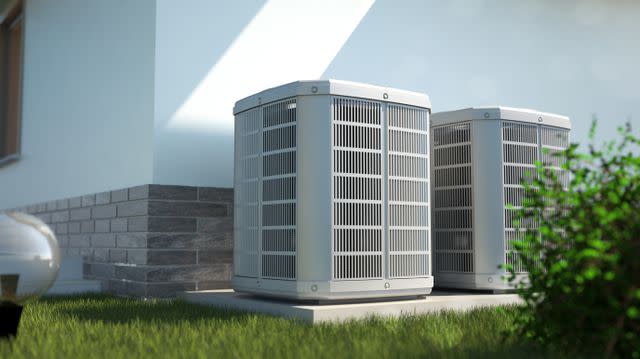How Long Does an Air Conditioner Last? Tips to Extend Its Lifespan
With summers getting hotter, how can you make the most of your air conditioner? Learn how to extend its lifespan with tips from experts.
Air conditioners are one of those household systems that people often don’t think about until it's too late. Whether the summer is fast approaching, the appliance isn’t cooling every room, or the HVAC unit needs maintenance, AC units need TLC all year round. But air conditioners have a finite lifespan. Understanding how long a window unit or a central air system will likely last helps homeowners plan for repairs, upgrades, and replacements. Experts say there are few steps homeowners can take to extend the life of their cooling system. Here’s how long to expect an AC unit to last and the signs that it's time for a new one.

Getty Images / KangeStudio
What Is the Average Lifespan of an Air Conditioner?
Each air conditioner system has a slightly different lifespan, depending on the unit type and manufacturer.
Lance Sinclair, president of One Hour Heating & Air Conditioning, says homeowners can expect a centrally installed HVAC system to last 10-20 years on average. Ductless mini-split systems use more energy-efficient inverter technology and can run at varying speeds as needed. If properly cared for, newer models last around 20 years.
“When it comes to window and wall AC units, size matters,” Sinclair says. An AC unit too small for the room will be running overtime to cool down the space, driving up electricity bills, and putting more pressure on the unit to overperform. An AC that is too big for the room will use more energy than is truly needed to cool the space, which can result in unnecessary wear and tear. An appropriately sized AC unit will optimize its lifespan. Window AC units typically last between 8-10 years, depending on how well they are maintained.
Factors That Affect an Air Conditioner’s Lifespan
Many factors affect how long an AC lasts, such as maintenance, usage, climate, and unit quality. And, of course, routine maintenance has a significant impact on its lifespan. Filter replacement, cleaning the outdoor HVAC unit and ducts, and quarterly professional maintenance can make all the difference.
How intensely and frequently an AC unit is used is a major determining factor in how long it lasts. Units that run for extended periods at low temperatures may wear out more quickly than those used intermittently or in an eco-friendly mode. However, AC usage will also depend on the outdoor climate. Air conditioners running in hot regions, along the coastline, or in areas with poor air quality will experience more wear and tear than in milder climates. “Extended run time, high humidity, and corrosion from salt spray can significantly reduce the life of an HVAC system,” Sinclair says.
Newer AC models with state-of-the-art technology are likely to outlast their older comparators. “Natural wear and tear is inevitable with a unit that gets regular usage,” Sinclair says. No AC unit will last forever, but proper maintenance and care can prolong its life.
How to Extend an Air Conditioner’s Lifespan
A good rule of thumb is the better cared for and well-maintained an AC unit is, the longer its lifespan is likely to be. For window and wall units, ensuring they are properly installed in an appropriately sized room is a good starting point to maximize efficiency and usage.
Sinclair says homeowners should schedule an annual maintenance check for their AC units and HVAC systems. Two checks are actually recommended to optimize performance, he says, one before the cooling season and one before the heating season. Keep in mind that older AC units might need more attention than newer ones. Aside from scheduling a regular professional HVAC maintenance check, Sinclair recommends homeowners replace or clean the air filters, clean around the outdoor AC unit, and clear dirt and debris from the base of the unit. These cleaning and maintenance tricks will prolong the AC unit’s life.
There are also plenty of non-AC-related ways to prevent a unit from overwork. Focus on alternative ways to cool a home, like using ceiling fans, closing blinds to reduce heat gain, or properly insulating the house. These can help ease the pressure on AC units on really hot days and help extend the lifespan of your air conditioning system.
Signs It’s Time for a Replacement
Generally, check the manufacturer’s user manual for the anticipated lifespan. If the AC unit is older, keep an eye out for any decrease in reliability, in addition to poor overall performance. Sinclair says if a home’s temperature doesn’t change, no matter how high or low the thermostat is set, this could indicate an issue with the thermostat or something within the HVAC system. If it isn’t a simple wiring issue, have a professional assess the unit to determine whether it’s a component issue or the entire system needs to be replaced.
Excessive noises, foul odors, and poor air quality are also signs it might be time for a new AC unit. “Odd noises are often indicative of failing components,” Sinclair says, which can be expensive to fix. Foul odors could be a sign the unit is burning off excessive dust, or that there are mold, moisture, or melting wires, he adds.
Poor air quality means the AC isn’t effectively filtering the air. If there’s no change after a filter replacement, it could be time for an upgrade. In these instances, it might end up being more cost-effective to replace the unit as opposed to repair or replace parts, especially if the unit is old and well past its warranty. When in doubt, consult a professional technician.
For more Better Homes & Gardens news, make sure to sign up for our newsletter!
Read the original article on Better Homes & Gardens.

